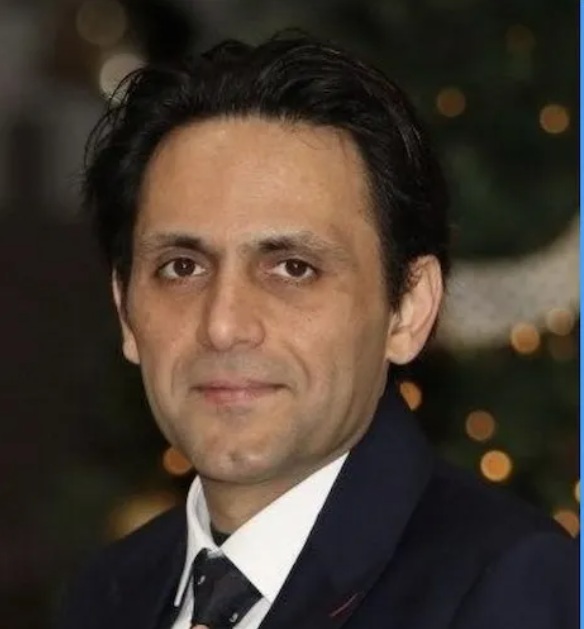Hooman Razavi
نوشته شده توسط Admin در 19 فوریه 25هومن رضوی

هومن رضوی در تهران، ایران متولد و بزرگ شد. در اوایل دهه ۲۰۰۰، به کانادا مهاجرت کرد و تحصیلات خود را در رشتههای علوم و آموزش به پایان رساند. علاوه بر سالها فعالیت به عنوان معلم، هومن به شدت در جامعه فکری مشارکت داشته و سالها عضو هیئت فلسفی آگورا، باشگاه فیلم نما نما، انجمن WISE و حلقه مگس بوده است. تمرکز و علاقه هومن به تحقیق در مورد سیستم آموزشی ایران پس از اتمام کارشناسی ارشد آموزش از دانشگاه تورنتو و همکاری با فعالان ایرانی و سایر ذینفعان جامعه فعال در دیاسپورا و ایران دوباره شعلهور شد. از سال ۲۰۱۹، هومن پنج مقاله را با تمرکز بر جنبههای مختلف، مسیر، چالشها و راه پیش روی سیستم آموزشی در ایران به پایان رسانده است. هومن روزگار و عصری را تصور میکند که در آن، از طریق تحقیقات قوی و همکاری، استعدادهای ایرانی و خرد جمعی بتوانند جهت تغییر و پیشرفت آموزشی را در وطن تحت تأثیر قرار دهند.
Hooman Razavi was born and raised in Tehran, Iran. In the early 200s, he moved to Canada and completed his studies in Science and Education. Apart from being engaged as a teacher for many years, Hooman has been heavily involved in the intellectual community and has been a member of the Agora Philosophical Board, NaMa Na Film club, WISE association and Fly-Bottle Circle for many years. Hooman’s focus and interest in researching the Iranian Education system reignited after completing his M.Ed at the University of Toronto and working alongside Iranian activists and other community stakeholders active in diaspora and Iran. Ever since 2019, Hooman has completed five papers concentrating on different facets, trajectory, challenges and the road ahead for the education system in Iran. Hooman envisions a day and era in which, through robust research and collaboration, Iranian talents and collective wisdom can influence the direction of Educational change and progress back Home
Hooman Razavi est né et a grandi à Téhéran, en Iran. Au début des années 2000, il a déménagé au Canada et a complété ses études en Sciences et en Éducation. En plus d’avoir été enseignant pendant de nombreuses années, Hooman a été fortement impliqué dans la communauté intellectuelle et a été membre du Conseil Philosophique Agora, du club de cinéma NaMa Na, de l’association WISE et du Cercle Fly-Bottle pendant de nombreuses années. L’intérêt de Hooman pour la recherche sur le système éducatif iranien s’est ravivé après avoir obtenu son M.Ed à l’Université de Toronto et avoir travaillé aux côtés d’activistes iraniens et d’autres parties prenantes de la communauté active dans la diaspora et en Iran. Depuis 2019, Hooman a rédigé cinq articles se concentrant sur différents aspects, trajectoires, défis et perspectives d’avenir pour le système éducatif en Iran. Hooman envisage un jour et une ère où, grâce à des recherches solides et à la collaboration, les talents iraniens et la sagesse collective pourront influencer la direction du changement et du progrès éducatif dans leur pays d’origine.
ABSTRACT
این مقاله به بررسی تکامل سیستم آموزشی ایران پس از سال ۱۳۵۷ میپردازد و نشان میدهد که چگونه سیاستهای دولتی منجر به کنترل ایدئولوژیک، نابرابریها و تبعیض سیستماتیک شده است. این مطالعه تأثیرات تاریخی، تغییر از نوسازی در زمان شاه به اسلامیسازی پس از انقلاب و پاسخهای دانشجویان، معلمان و روشنفکران به سیاستهای محدودکننده را بررسی میکند. این مقاله با استفاده از نظریههای ضد ظلم و مخالفت، اشکال مختلف مقاومت، از جمله اعتراضات مسالمتآمیز، فعالیت آنلاین، آموزش زیرزمینی و نافرمانی نمادین را دستهبندی میکند. استدلال میشود که علیرغم تشدید کنترل دولت، مخالفت به اشکال مختلف، ناشی از تغییر نگرشهای جامعه و پیشرفتهای تکنولوژیکی، همچنان ادامه داشته است. این مطالعه نتیجه میگیرد که سیستم آموزشی ایران همچنان میدان نبردی بین ایدئولوژی تحمیل شده توسط دولت و خواستههای فراگیری است و احتمالاً مخالفت در پاسخ به سیاستهای دولتی به تکامل خود ادامه خواهد داد.
“This paper explores the evolution of Iran’s education system post-1979, highlighting how government policies have led to ideological control, inequities, and systemic discrimination. The study examines historical influences, the shift from modernization under the Shah to Islamification after the revolution, and the responses of students, teachers, and intellectuals to restrictive policies. Using anti-oppressive and dissent theories, the paper categorizes various forms of resistance, including peaceful protests, online activism, underground education, and symbolic defiance. It argues that despite the government’s tightening control, dissent has persisted in various forms, driven by changing societal attitudes and technological advancements. The study concludes that Iran’s education system remains a battleground between state-imposed ideology and demands for inclusivity, with dissent likely to continue evolving in response to state policies.”
“Cet article explore l’évolution du système éducatif iranien post-1979, mettant en lumière comment les politiques gouvernementales ont conduit à un contrôle idéologique, à des inégalités et à une discrimination systémique. L’étude examine les influences historiques, le passage de la modernisation sous le Shah à l’islamisation après la révolution, ainsi que les réponses des étudiants, enseignants et intellectuels aux politiques restrictives. En utilisant les théories anti-oppressives et de dissidence, l’article catégorise diverses formes de résistance, y compris les manifestations pacifiques, l’activisme en ligne, l’éducation clandestine et la défiance symbolique. Il soutient que malgré le renforcement du contrôle gouvernemental, la dissidence a persisté sous diverses formes, alimentée par l’évolution des attitudes sociétales et les avancées technologiques. L’étude conclut que le système éducatif iranien reste un champ de bataille entre l’idéologie imposée par l’État et les demandes d’inclusivité, la dissidence étant susceptible de continuer à évoluer en réponse aux politiques étatiques.”